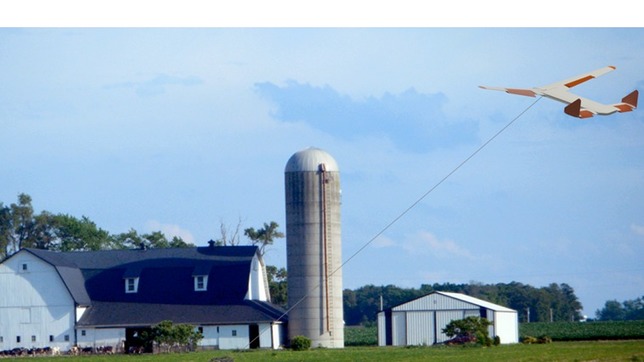
OEN Member NewsVertueLab vs. climate change (Portland Business Journal)
A small Beaverton company looking to do something big in the world of wind power recently learned that it’s getting a $600,000 grant through the Small Business Innovation Research program. That brought federal funding for eWind Solutions to $1.4 million and boosted hopes of doing a beta test of its tethered-drone system next year.
But there’s an unsung hero in the story.
“We wouldn’t have been able to do it without Oregon BEST,” said Katie Schaefer, eWind’s director of strategic partnerships.
She was referring to the state-backed organization that for the past decade has been a source of assistance to Oregon innovators looking to turn cleantech ideas into companies.
Earlier this year, Oregon BEST took on a new name, VertueLab, and announced a strategy to overcome waning support from Salem and find the money it needs to boost more early-stage startups.
Now that strategy is taking clearer shape. VertueLab is focusing squarely on tackling climate change and aiming to do so by grabbing a piece of the growing pool of wealth that is migrating to millennials and women.
“We’re in the final stages of nailing down a structure of a fund we’ll be launching in the first quarter of 2019,” David Kenney, the organization’s leader since 2008, said. “We’ve got as strong a record as anyone in the country supporting super-early stage innovation, and we think this is a way we can expand upon that.”
A standout program
Oregon’s commitment to developing a cleantech sector already has put it in rare company in the U.S.
A study by Vanderbilt University researchers earlier this year looked at cleantech business-development policies in the four most populous states in the country, and “four other states that have cleantech sectors with strong policies.”
Oregon was one of those.
Oregon BEST was launched in 2007, one of three “Signature Research Centers” (along with ONAMI and OTRADI) that grew out of 2005 legislation that created the Oregon Innovation Council.
The organization has provided a range of services to startups and startup wannabes, but its highest profile role has been to fund early-stage ventures, which it did with grants before turning to convertible-note investments.
eWind Solutions was aided in obtaining its first federal grant, and later got a $125,000 investment.
Higher-profile success stories include flow-battery maker ESS, which completed a $13 million Series B round last December, bringing its total venture funding to $17 million; Arcimoto, the three-wheeled EV manufacturer that went public and has built out a factory in Eugene; and Iotas, an innovation award winner in the smart home category at the 2017 Computer Electronics Show..
But in a strategy shift of its own, the state has trimmed VertueLab’s funding, from around $6 million in the past biennium to $2.5 million in the current two-year period.
Accelerating change
That’s accelerated a shift that Kenney said the organization had been contemplating.
As Kenney said last June when the new name and strategy were first unveiled, “We were at the point where we were having companies coming to us for capital because they thought we had money, and we had to say, well, actually, we don’t have any right now.”
Ken Vaughn, VertueLab’s director of impact investments, has been the point man on exploring how the group’s fund will work. Reached early this week at RI Americas 2018, a New York conference for sustainable business and finance (the “RI” stands for “responsible investor”), Vaughn said early stage venture capital in the cleantech space has plummeted nearly 90 percent in the past decade, even as the need for innovation to take on climate change has grown.
“The problem is it takes these technologies a very, very long time to get to market,” he said. “It just doesn’t fit the traditional venture capital model well.”
But if the initiatives succeed, he said, they can pay off, not just for the planet, but in local economic development terms.
“The cleantech industry leans toward hardware, so the innovations tend to have manufacturing associated with them,” he said. “That translates to the potential for more middle-income jobs than you might have with other industries.”
Vaughn said VertueLab believes its fund can serve purely philanthropic aims as well as investors who have a complementary interest in realizing a return.
“The idea is impact first, but also potentially financial return,” he said.
Reegan Rae, managing director of wealth management at Arnerich Massena, a Portland firm that emphasizes impact investing, said the money target VertueLab has set makes sense. Some $1 trillion a year, she said, is moving from the greatest generation to baby boomers and landing with millennials — mostly women too.
“Their timing is perfect,” Rae said. “Women are going to become the primary wealth owners in the U.S., and women care more about doing good with dollars than getting a return,” Rae said. “And millennials care more about doing well, about leaving the earth better than they found it.”
It’s the climate, stupid
In its earlier incarnation, VertueLab developed a fairly eclectic portfolio, with companies like Kerr Avionics, which was pursuing improvements in its guidance system, and Manage My Co-op, a startup looking to develop software for bulk grocery ordering.
Such investments are unlikely in the future.
“Climate is the existential challenge of our day,” Kenney said. “That’s where we’ll be putting more and more of our focus.”
Through its wide range of services, and its investments, Kenney believes VertueLab will continue to serve Oregon. But with money coming from a wider range of sources, its investments are likely to extend beyond the state.
“It’s important for us to position ourselves to (potential investors) as not being just an Oregon economic development initiative but rather a national, prominent player in connecting investors with startups,” he said.
Source: www.bizjournals.com

